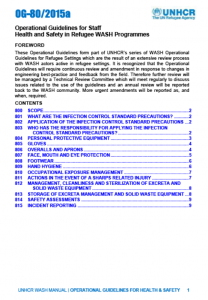
This document provides health and safety guidelines for refugee WASH programmes for staff are involved in either: cleaning of toilets; maintenance of toilets; desludging of toilets; the collection and movement of excreta; the collection or movement of solid wastes; the handling of vector control or water treatment chemicals; any staff who may potentially come into contact with excreta, sewage, wastewater, solid waste, medical waste or any other sources of (potential) infection.
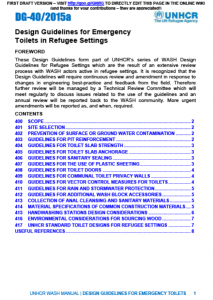
This document contains guidelines for toilets in refugee settings including: site selection; prevention of surface or ground water contamination; pit reinforcement; toilet slab strength; toilet slab anchorage; sanitary sealing; use of plastic sheeting; toilet doors; privacy walls; vector control measures; rain and stormwater protection; wash block accessories; collection of anal cleansing and sanitary materials; material specifications; handwashing stations design considerations; and environmental considerations for sourcing wood .
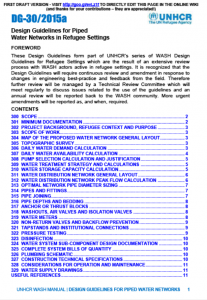
This document contains guidelines to help UNHCR and WASH actors design piped water networks in refugee settings. It describes the minimum documentation that should be included for a water network design project.
Tags: Piped Water Networks, WASH Monitoring, WASH Programme Management, WASH Strategy Development, Water Pumping, Water Storage, and Water Supply. Languages: English. Organisations: UNHCR. Categories: WASH Design Guidelines, WASH Guidelines, WASH Policy Guidelines, WASH Reference Documents, and WASH Technical Designs.
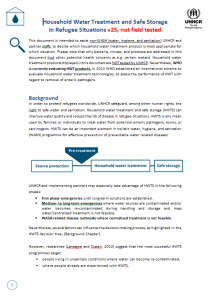
This document contains guidelines to help WASH actors in refugee settings select household water treatment products. The document includes an overview of: • Categories of HWTS; • Health benefits; • When to use HWTS and existing decision tree; • Criteria regarding HWT to be considered by the field; • Mandatory components; • UNHCR Checklist for HWTS; • HWT concerns; • Household water treatment cards; • Safe water storage;• Further reading; • Acknowledgement
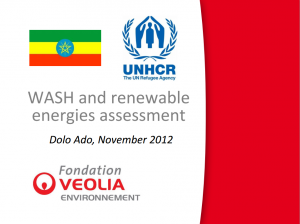
This document looks at drinking water, sanitation and renewable energy solutions and options in three camps in Dolo Odo with recommendations and conclusions.
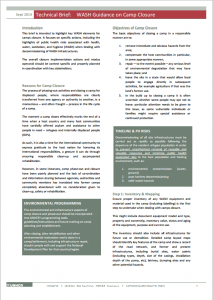
This brief is intended to highlight key WASH elements for camps closure. It focuses on specific actions, including the highlights of public health risks associated with health, water, sanitation, and hygiene (WASH) when dealing with decommissioning of WASH infrastructures. The overall closure implementation actions and modus operandi should be context specific and properly planned in coordination with key stakeholders.
Tags: Camp Closure, Cross Cutting, Environment, Excreta Management, Solid Waste Management, WASH Coordination, WASH Programme Health and Safety, WASH Programme Management, WASH Strategy Development, and Water Supply. Languages: English. Organisations: UNHCR. Categories: WASH Guidelines, WASH Operational Guidelines, WASH Policy Guidelines, and WASH Reference Documents.
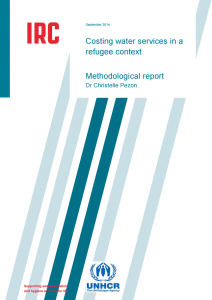
This report presents a methodology to cost water services that has been adapted from the life-cycle costs approach (LCCA) and looks at its applicability to refugee settings.

These WASH related primer questions have been designed to assist UNHCR and WASH actors collect data from key informants and focus groups during WASH assessments. The list of questions is not exhaustive and is merely intended as a conversation primer (aide memoire).
Tags: Excreta Management, Human Right to Water / Sanitation, Hygiene Promotion, Protection, Public Health, Solid Waste Management, WASH Assessments, WASH Monitoring, WASH Strategy Development, and Water Supply. Languages: English. Organisations: UNHCR. Categories: WASH Blank Forms, WASH Emergency Guidelines, WASH Emergency Tools, and WASH Reference Documents.
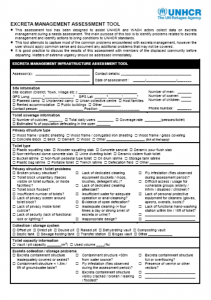
This assessment tool has been designed to assist UNHCR and WASH actors collect data on excreta management during a needs assessment. The main purpose of this tool is to identify problems related to excreta management and identify actions to bring conditions to UNHCR standards.
Tags: Communal Toilets, Desludging and Excreta Transportation, Excreta / Urine ReUse, Excreta Composting, Excreta Management, Excreta Treatment, Household Toilets, Sewerage and Excreta Conveyance, WASH Assessments, and WASH Monitoring. Languages: English. Organisations: UNHCR. Categories: WASH Blank Forms, WASH Emergency Guidelines, WASH Emergency Tools, and WASH Reference Documents.
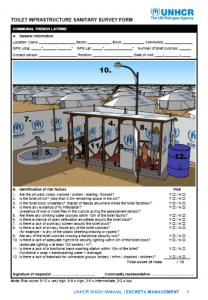
This sanitary survey form can be used to monitor and evaluate the condition of communal and public toilet blocks in a refugee setting. The main purpose of this tool is to rapidly identify public health and protection related risks. The tool can also be used in the medium term to monitor trends in the condition of toilet infrastructure.
 English
English










